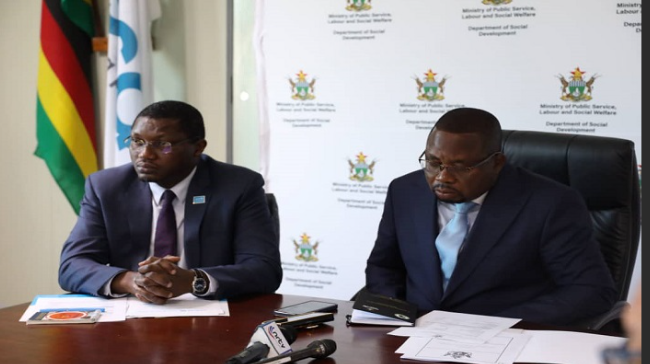Preserving the family with child social protection in Zimbabwe.
Social protection is a crucial aspect of ensuring the well-being of families and children. It encompasses a range of policies and programs designed to mitigate the lifelong effects of poverty and exclusion.


Social Protection
- Social protection includes various initiatives such as cash transfers (Emergency Social Cash Transfer Programme (ESCT)), child grants, school meals, and skills development. These programs aim to connect families with essential services like healthcare, nutritious food, and quality education.
- Unfortunately, nearly three out of four children worldwide lack coverage under any form of social protection, leaving them vulnerable to economic hardship and social exclusion.
- Factors such as living in hard-to-reach areas, conflict, violence, and natural disasters often result in families being excluded from social protection programs.
- Girls, boys with disabilities, and women face specific risks and discrimination, affecting their likelihood of experiencing poverty and unpaid care burdens
the initiatives implemented to support families and enhance child well-being:
Department of Social Services (DSS)
Plays a vital role in delivering family social protection services. Their efforts focus on preserving families and preventing the separation of children from their families. When governments prioritize family preservation, they aim to provide services that support families in adequately caring for their children. This approach is central to a country’s development, as it builds human capital through healthy early childhood development, access to public services, and safety nets to prevent families from falling into poverty.
Institutionalization Prevention or Family Preservation Programs.
- The primary goal of these programs is to sustain the care of children within their families, preventing their placement into alternative care arrangements.
- The effectiveness of these efforts depends on the extent to which family support services can be developed and implemented by the government
Government Capacity for Intervention
- The Department of Social Services (DSS) within the Ministry of Public Service, Labour, and Social Welfare (MPLSW) plays a pivotal role.
- Prevention programs address family issues such as neglect, abuse, and parental substance abuse.
- These issues differ from cases of parental death or deliberate abandonment, where adequate care can only be provided after the event.
- Cash transfers can assist households coping with the loss of a breadwinner or labor-constrained situations
Social Protection Instruments in Zimbabwe:
- Zimbabwe has a rich tradition of social protection, with various instruments implemented under each of the social protection pillars.
- These include cash and in-kind transfer, Public works programs, and health and education assistance.
Packing Services
Storage Services
Furniture Assembly
Partners - in - crime
UNICEF’s Role in Zimbabwe
UNICEF’s social and child protection programs aim to reduce multidimensional poverty among households. These programs protect children and families from violence, abuse, and exploitation. Notably, UNICEF’s Cash Transfer project focus on vulnerable families, while child protection interventions occur through community childcare initiatives.
- Health Worker Support
- Youth Empowerment
- Water, Sanitation, and Hygiene (WASH)
- Solarization Project for Rural Education

Partners - in - Crime
NGO assisting in social protection in zimbabwe
1
UNICEF Zimbabwe
- UNICEF has been actively involved in strengthening social protection systems in Zimbabwe. One of their successful programs is the Emergency Social Cash Transfer Programme (ESCT), introduced in partnership with the Ministry of Public Service, Labour, and Social Welfare.
- The ESCT aims to provide immediate support to chronically vulnerable households in urban areas, helping them cope with the impact of COVID-19. It also aligns closely with the government-led Harmonised Social Cash Transfer Programme (HSCT).
- Through the ESCT, over 113,500 people in 25,000 households across eight districts (including Harare, Bulawayo, Masvingo, Matabeleland North, and Matabeleland South) receive timely cash transfers every month
2
National Association of Non-Governmental Organizations (NANGO)
- NANGO serves as an umbrella body for NGOs operating in Zimbabwe.
- Their focus areas include civil society coordination and alliance building, advocacy, monitoring, and raising awareness. NANGO mobilize voices of the vulnerable to campaign for national and local government processes that address inequalities.
- NANGO is registered as a Private Voluntary Organisation (PVO) under the PVO Act Chapter [17:05].
- It operates as a non-partisan, non-profit making, and non-denominational organization.
- The organization’s operations are guided by its constitution, which governs the conduct of the NANGO secretariat, board, and members.
3
Childline Zimbabwe
- A vital organization dedicated to protecting children from violence and abuse.
- Childline Zimbabwe operates the 116 Freephone Helpline, which is accessible from any phone on any network within Zimbabwe.
- This helpline runs 24 hours a day, providing a toll-free service for children in need.
- To reach Childline, simply dial 116.
- WhatsApp: You can also reach them via WhatsApp at +263 719 116 116 or +263 732 116 116.
- Live Chat: Use the live chat feature on their website between 8 am and 5 pm.
- Drop-In Centres: Child-friendly, confidential face-to-face counseling is available at their 34 community-based Drop-In Centres across Zimbabwe. These centers are operated by qualified social workers and counselors, supported by trained community volunteers.



